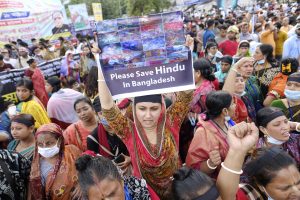Bangladesh has been reeling under communal violence since October 13. Hindus, the country’s largest religious minority, were celebrating Durga Puja, the biggest festival for the community, when violence targeting Hindu temples, homes, and businesses erupted across the country.
The immediate trigger for the violence was a Facebook post showing a copy of the Quran, Islam’s holy book, allegedly at the feet of an idol of Hindu deity in Nauar Dighir Par Mandir, a temple in the eastern district of Cumilla. The post went viral and triggered the worst form of communal violence witnessed in Bangladesh in decades.
Following the alleged desecration of the Holy Quran, mobs attacked the temple and vandalized the idols, according to a statement by the World Hindu Federation of Bangladesh. Soon after, violence spread across other areas of the town, prompting the temple committee to call the police and fire brigade teams. At least 50 people were injured in the clashes. Many houses and properties of local Hindus were reportedly attacked as the news spread like wildfire across the country.
In Chandpur’s Hajiganj, at least four people were killed and several injured as the mob clashed with the police last Wednesday. Authorities imposed Section 144, prohibiting public gatherings, in Hajiganj following the violence, and the Border Guard Bangladesh (BGB) was deployed to restore law and order, according to Daily Star, an English daily. Local media in Chandpur reported that at least 60 people, including journalists and police, have suffered injuries.
In Noakhali, several thousands of people joined together to protest against the alleged disrespect of the Quran after Friday prayers in the mosque, which coincided with the last day of the Durga Puja rituals.
However, the protest quickly turned violent when some participants in a procession forced their way into the Bijoya Durga Temple on College Road in Begumganj around 2:30 p.m. They beat up and stabbed Jatan Kumar Saha, who was a member of the temple’s executive committee. Saha succumbed to his wounds in Noakhali Sadar Hospital later in the day. At least 10 temples and over 50 businesses of the Hindu community in Noakhali were vandalized. At least 50 people, including cops, were injured.
In Chattogram, local religious zealots participating in the protests in the city’s Andarkilla area after Friday prayers started throwing bricks at the Jemson Hall temple, which hosted the Durga Puja celebrations, trying to vandalize the temple. Police fired into the air and lobbed tear gas canisters to disperse the vandals. At least 50 protesters have been detained, the deputy commissioner of the south division of Chattogram Metropolitan Police.
In the capital Dhaka, protests turned violent after religious fanatics clashed with the police outside Baitul Mukarram mosque following the Jummah prayers. They threw bricks at the police, who baton charged the mobs in response. Five policemen were injured on Friday, and at least five people were detained. The clashes continued even the day after when some 10,000 protesters gathered in the area, carrying banners of Islamist political parties, and chanted “Down with the enemies of the Islam” and “Hang the culprits.”
Security throughout the country has been strengthened with members of the Rapid Action Battalion (RAB), BGB, and different intelligence agencies deployed in addition to the police. Teams of BGB were also deployed in Cumilla, Narsingdi, Munshiganj, and 19 other districts to ensure law and order, said a separate press release by the BGB.
Overall, at least 13 temples were desecrated and 40 businesses belonging to people of the Hindu community were vandalized in five districts. Further, 95 people were also injured. Almost 100 people have been arrested in different districts in connection to the violence, and around 4,000 people have been booked for the violence.
On Sunday, groups of unidentified men in Pirganj of Rangpur set fire to 25 houses and shops belonging to the Hindu community. Many lost all their belongings in the latest arson attack. Some even fled and hid in the darkness of the night under open skies to save themselves. “So many people entered the village and attacked us with sticks and sharp weapons. I didn’t recognize anyone. My house was looted, and the store was set on fire,” a grieving survivor said. “How do we survive now?” he wondered aloud. “Shall we just leave then?”
Bangladesh Prime Minister Sheikh Hasina, while visiting the Dhakeshwari National Temple, vowed to take appropriate action against those behind the violence. “They must be found out. We did so in the past and will do it in the future too. They must face due punishment. We want such punishment so that none dare to engage in communal incidents,” she said.
Separately, State Minister for Religious Affairs Faridul Haque Khan also stated that authorities had taken note of the unfolding events and the local administration has been instructed to investigate the matter. Home Minister Assaduzzaman Khan has said that several individuals have been identified in connection with the violence at Cumilla and would be arrested soon.
The recent outbreak of violence adds to Bangladesh’s long history of communal violence against minorities. According to a human rights organization, Ain o Salish Kendra (ASK), at least 3,710 attacks against the Hindu community have been registered between January 2013 and September 2021. Vandalizing homes and shops, arson attacks on Hindu temples, land-grabbing – even desecration of Buddhist temples – were also registered during the period. This time, however, the violence has left exposed the fault lines that make up Bangladesh’s conservative drift, with many minorities feeling they have been left to fend for themselves.

































